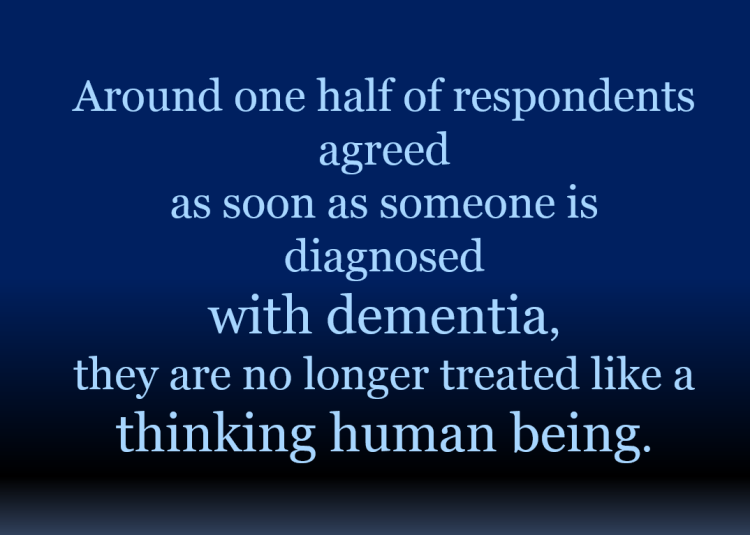Dementia Friends in Canada – showing there is a “wrong type of education”
Chris argued that we can all ‘be aware’, but “awareness is very different from education”. Continue reading
Chris argued that we can all ‘be aware’, but “awareness is very different from education”. Continue reading
These 11 facts that raise awareness about dementia come from buzzfeed.com.
posted on Jun. 5, 2015, at 5:36 p.m, courtesy of Alzheimer’s Society (UK).

thinkstockphotos.co.uk / Via thinkstockphotos.co.uk
There are 850,000 people in the UK living with dementia, which means you might know someone affected by the condition. Dementia is not just about memory loss – there are many different kinds of dementia, and symptoms vary widely.

In 2010, Northern Ireland Life and Times (NILT) Survey was conducted in order to influence policy on dementia in Northern Ireland. This report, published in 2011, included a module of questions exploring attitudes and knowledge of dementia.
Critically, this survey has inquired about perceptions, attitudes and awareness of dementia. We know that just under 50 per cent of those who partook in the survey had direct experience of knowing someone who is living with dementia, of which half are a family member. The views reflected by the survey confirm much of what needs to be challenged about attitudes, care and services for people with dementia and the need to address this in public policies and research, as well as in practice through the provision of services.
The survey results highlight the public’s knowledge of dementia (happily, 94% know that it is a disease of the brain), how people describe dementia (90% of respondents said ‘confused’ was the main way they would describe the appearance of someone with dementia), how society thinks about and cares for people with dementia (83% said ‘there comes a time when all you can do for someone with dementia is to keep them clean, healthy and safe’), and views on the effects of dementia over time.
It makes me incredibly sad that around half of the respondents felt that once someone has a diagnosis, they are not longer viewed as a capable, thinking human being. This highlights the point that most people think of people who have dementia as one group – the oldest old who are in the later stages of dementia. They don’t typically think of the younger people with dementia, the people who are still working at jobs or caring for their families, the people who are still writing books and educating others.This viewpoint perpetuates stigma and makes it much more uncomfortable for people with dementia to share their diagnosis with their friends and family. My hope is that this changes in the coming years, that more people with dementia will share their voices and experiences, and that more of the public will realize these are thinking, feeling human beings who are still capable of many things.
It’s an interesting report, you can read it in full here.